
For most business leaders, it doesn’t matter who wins the project as long as it is implemented the soonest possible time.
A complaint lodged by Filinvest against GMR-Megawide means the project will be delayed well into 2017 or a year after President Benigno Aquino III steps out of office.
There are pros and cons to each bidder but we’d rather discuss three requirements that may or may not have made it to the national government’s terms of reference (TOR), the framework with which the project will be built on.
One, that the terminal project and all facilities should, naturally conform to existing building codes and standards set by international airports around the world.
The country’s central airport, the Ninoy Aquino International Airport, has yet to be fully certified as meeting international standards even with its terminal expansion project. It would be interesting to see if whoever wins the project can help transform the MCIA into a world-class airport.
Two, that the structures can withstand natural calamities like typhoons and earthquakes similar to the ones experienced in the past two years. While last year’s earthquake fortunately didn’t compromise the MCIA’s structural integrity, it’s better if the new terminal and other related equipment are built to endure rather than collapse at the slightest quake.
Third and the most obvious and immediate, is that the winning bidder builds the facilities with the passengers’ convenience in mind. The MCIA expansion project need not be imposing or structurally impressive. Comfort and ease of use are prioritized over aesthetics.
Too often, plans by any developer can go awry due to budget shortfalls or a disapproved loan application, or natural calamities and other reasons. We trust that the two major bidders have contingency plans to deal with these situations.
While the three requirements may not even be considered as a layman’s idea of a good airport, these essentials, along with the assurance that there won’t be any corruption and irregularities in the awarding and implementation of the project, should be guaranteed if the MCIA expansion project is to be a qualified success.
RELATED STORY:
Making sense of the delayed airport project